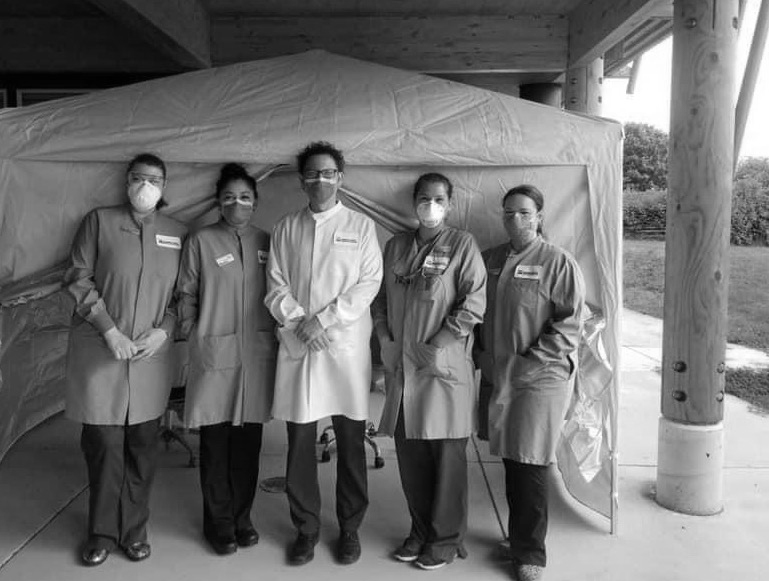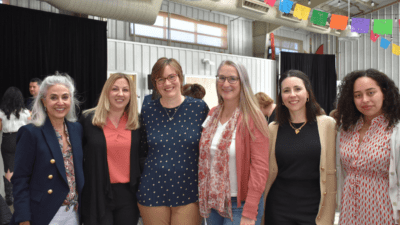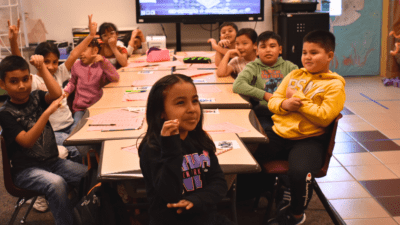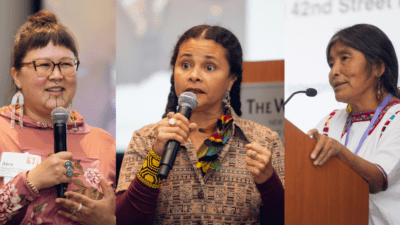Sarah Chagnon, a Swinomish Tribal member in Washington, was in for a routine dental cleaning when her dentist pulled her aside and encouraged her to look into dental therapy. At the time, she was just finishing up her prerequisites for a nursing program at a local community college, but her interest was piqued, and she decided to explore dental therapy further. Sarah was able to shadow Daniel Kennedy, one of the first dental therapists in the United States, and after observing him, she knew that she was meant to pursue dental therapy.
Sponsored by the Swinomish Tribe, Sarah packed up her family and moved to Alaska to complete her dental therapy education – a decision she calls one of the best she’s ever made. During her schooling she lived in Anchorage and the small rural Alaskan village called Bethel. There she worked at the Bethel Yuut Dental Clinic as well as the Yukon Kuskokwin Hospital. She then returned home, and currently practices at the Swinomish Dental Clinic.

Pursuing a career in dentistry was a calling for Sarah. She personally understands the incredible need for high-quality, accessible, culturally competent care having grown up with a great deal of fear and trauma associated with dentistry as a child.
Connection is key. Sarah believes in letting her patients know that they’re not alone, that she’s been there too. Above all, she wants her patients to feel safe with her. Sarah is fully committed to providing the best care she can to patients while also providing holistic dental support to her community. She hopes to improve conditions for those struggling with their teeth and help them be proud of their smile. Sarah loves working with children and hopes that having a dental therapist in the community will increase access to dental care, help families overcome dental fears and reduce the number of kids referred out for services.
With dental therapists, the Swinomish Dental Clinic has expanded its chairs and employees. Currently, they have 17 chairs and the staff is up to 18 people. Most importantly, the clinic has had a great response to its dental therapists from the community. Before dental therapists were on staff, dentists only had the capacity to schedule one root canal per week. Now they’re able to schedule two or three a day when needed. Dental therapists have been able to free up dentists to focus on more complicated procedures that require more time.
When the COVID-19 pandemic hit, Sarah and her colleagues weren’t sure what the future of the clinic would look like, so she began creating innovative tools to stay connected and continue educating her patients. Through videos, Sarah provided useful information on how and why we brush our teeth and how disclosing tablets work, among others. She also delivered toothbrushes and toothpaste to the homes of preschoolers whom they previously visited in person weekly. Sarah believes now, more than ever, people need access to cost-effective dental care, and dental therapists are part of the solution.
For Sarah, becoming a dental therapist is not only a career but a meaningful way to connect with the community and to help people. It’s who she is.
“For Want of a Dentist: The Rise of the Dental Therapy Movement in Tribal Nations and the U.S., Lessons from the W.K. Kellogg Foundation”
February is National Children’s Dental Health Month and WKKF is featuring several practicing, community dental therapists and sharing how they are creating jobs, reaching underserved communities, providing cost-effective care, increasing access through innovation and making a difference. Follow everychildthrives.com for updates and check out WKKF’s dental therapy e-resource guide for information.







Comments